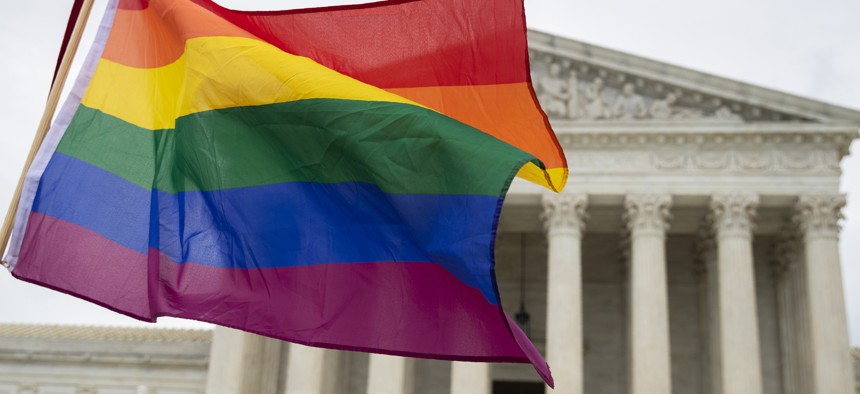Gay and Transgender Workers Protected By Federal Employment Law, Supreme Court Rules

AP Photo
STATE AND LOCAL NEWS ROUNDUP | Louisiana governor vetoes “critical infrastructure” trespassing bill … Cuomo warns maskless New Yorkers that more lockdown could be coming … Rhode Island AG wants to handle more police misconduct cases.
A federal civil rights law forbids employers from firing employees for being gay or transgender, the Supreme Court ruled in a major decision Monday that provides employment protections for LGBTQ workers for the first time in more than half the states. The 6-3 decision was written by Justice Neil Gorsuch, a conservative jurist appointed by President Trump. He found that a 1964 law that prohibits discrimination because of race, religion, national origin and sex applies to gay and transgender workers. “An employer who fires an individual for being homosexual or transgender fires that person for traits or actions it would not have questioned in members of a different sex,” Gorsuch wrote. The group of cases considered by the court included one brought by Gerald Bostock, who says he was fired from his position in a Georgia child welfare services department after he joined a gay softball league. Bostock celebrated the decision. “The long, seven-year journey I’ve had, it’s well worth every ache and pain,” he said. “I didn’t ask for this, but it needed to be done.” In his dissent, Justice Samuel Alito complained that the interpretation of the decades-old law amounted to the court crafting legislation, instead of leaving that to Congress. [New York Times; SCOTUSblog; Washington Post]
PROTEST PENALTY VETO | Louisiana Gov. John Bel Edwards vetoed a bill that would have created a three-year mandatory minimum sentence for people convicted of trespassing on “critical infrastructure” during a declared emergency. The measure, which some said could be used against protesters who have tried to stop oil and gas pipeline development, increased the penalties for an already tough state law. Edwards said the bill was too broadly written, while also noting that Louisiana is often in a state of emergency, which would mean the increased penalties would always be in force. [Inside Climate News]
PROTEST SIGNS | Three museums in Washington, D.C.—The African American History and Culture Museum, the American History Museum, and the Anacostia Museum—have begun to collect and curate protest signs that adorn the fences around the White House. Museum officials say they have been collaborating with the orchestrators of protests against police brutality to respectfully collect the signs. [Courthouse News Service]
BACK ON LOCKDOWN | As photos of large groups of maskless bar and restaurant patrons in New York City spread on social media, Gov. Andrew Cuomo warned Mayor Bill de Blasio that he could put the city back on lockdown. “I understand it’s not popular. Nobody wants to go to a sidewalk with people drinking and say, ‘You people can’t drink on the sidewalk. You know what’s more unpopular? If that region closes because that local government did not do their job,” Cuomo said. [Washington Post]
POLICE MISCONDUCT | Rhode Island Attorney General Peter Neronha said that he plans to become more involved in police misconduct cases in the state when misdemeanor misconduct is involved, instead of just handling felonies. He is asking police chiefs in the state to refer potential misdemeanor misconduct cases to the attorney general’s office, rather than having city attorneys deal with those. [Boston Globe]
Laura Maggi is the managing editor at Route Fifty and Emma Coleman is the assistant editor.
NEXT STORY: Public Health Officials Face Wave Of Threats, Pressure Amid Coronavirus Response





